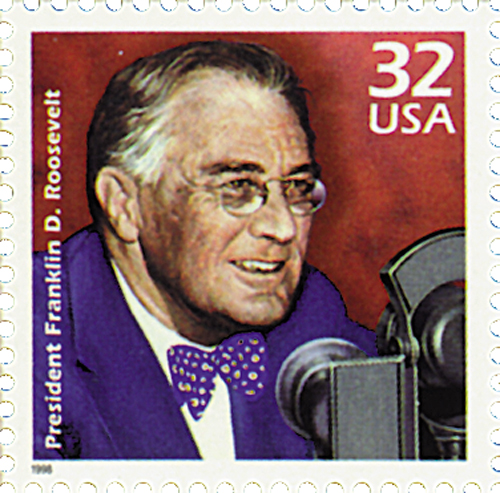

Â
On November 7, 1944, Franklin D. Roosevelt became the first and only U.S. President elected to a fourth term.
Franklin Roosevelt first ran for President in 1932. He ran against incumbent President Herbert Hoover, who many blamed for the Great Depression. Roosevelt’s contagious optimism and promise of a “New Deal†helped sweep him into office. And he followed through on his promises, instituting a number of new improvement programs during his first 100 days in office. Roosevelt’s progressive programs helped America out of the Depression and he was easily re-elected in 1936.

By 1940, much of the world was at war and Roosevelt was approaching the end of his second term. Though it wasn’t a written law, most presidents before him chose not to run for a third term, following George Washington’s example. Early on, Roosevelt had suggested that he wouldn’t run for a third term. But as the war continued overseas, he believed he was the only one with the experience and skills to lead the nation through the Nazi threat. Though his choice to run for a third term was controversial, Roosevelt won the election by a comfortable margin.

A little over a year later, the Japanese attacked Pearl Harbor, and Roosevelt had to break his campaign promise to keep America out of the war. He joined with Britain to form the Allied Powers to fight Germany and Japan.
In 1944, Roosevelt faced another election. He easily won his party’s nomination, but many opposed his vice-president, Henry Wallace. Roosevelt’s health was noticeably declining, and many within his own democratic party believed that Wallace was too left-wing to assume the presidency if something happened to him. Party leaders suggested Senator Harry Truman. Though Roosevelt didn’t know him, he agreed to accept him as his running mate to maintain party unity.

There were several Republican front runners early on, including General Douglas MacArthur. But as he was commanding Allied troops in the Pacific, he couldn’t campaign. Ultimately, New York Governor Thomas E. Dewey won the party’s nomination. He criticized FDR’s New Deal and pushed for a smaller government and less-regulated economy.

Roosevelt didn’t plan to campaign, but as rumors about his ill-health flourished, he launched a vigorous tour in October. He rode in an open car through city streets to show Americans he was in good health. American victories in the Pacific kept Roosevelt’s popularity high and he easily won the election on November 7, 1944. He did win by a smaller percentage than in the previous elections, though.

Concerns over Roosevelt’s health were not unfounded. The April following his election, he suffered a stroke and passed away, leading Truman to ascend to the presidency.
In the years after the election, the Republican party campaigned to set a two-term limit on the presidency. They succeeded in 1951 with the passage of the 22nd Amendment
Â
Â
On November 7, 1944, Franklin D. Roosevelt became the first and only U.S. President elected to a fourth term.
Franklin Roosevelt first ran for President in 1932. He ran against incumbent President Herbert Hoover, who many blamed for the Great Depression. Roosevelt’s contagious optimism and promise of a “New Deal†helped sweep him into office. And he followed through on his promises, instituting a number of new improvement programs during his first 100 days in office. Roosevelt’s progressive programs helped America out of the Depression and he was easily re-elected in 1936.

By 1940, much of the world was at war and Roosevelt was approaching the end of his second term. Though it wasn’t a written law, most presidents before him chose not to run for a third term, following George Washington’s example. Early on, Roosevelt had suggested that he wouldn’t run for a third term. But as the war continued overseas, he believed he was the only one with the experience and skills to lead the nation through the Nazi threat. Though his choice to run for a third term was controversial, Roosevelt won the election by a comfortable margin.

A little over a year later, the Japanese attacked Pearl Harbor, and Roosevelt had to break his campaign promise to keep America out of the war. He joined with Britain to form the Allied Powers to fight Germany and Japan.
In 1944, Roosevelt faced another election. He easily won his party’s nomination, but many opposed his vice-president, Henry Wallace. Roosevelt’s health was noticeably declining, and many within his own democratic party believed that Wallace was too left-wing to assume the presidency if something happened to him. Party leaders suggested Senator Harry Truman. Though Roosevelt didn’t know him, he agreed to accept him as his running mate to maintain party unity.

There were several Republican front runners early on, including General Douglas MacArthur. But as he was commanding Allied troops in the Pacific, he couldn’t campaign. Ultimately, New York Governor Thomas E. Dewey won the party’s nomination. He criticized FDR’s New Deal and pushed for a smaller government and less-regulated economy.

Roosevelt didn’t plan to campaign, but as rumors about his ill-health flourished, he launched a vigorous tour in October. He rode in an open car through city streets to show Americans he was in good health. American victories in the Pacific kept Roosevelt’s popularity high and he easily won the election on November 7, 1944. He did win by a smaller percentage than in the previous elections, though.

Concerns over Roosevelt’s health were not unfounded. The April following his election, he suffered a stroke and passed away, leading Truman to ascend to the presidency.
In the years after the election, the Republican party campaigned to set a two-term limit on the presidency. They succeeded in 1951 with the passage of the 22nd Amendment
Â